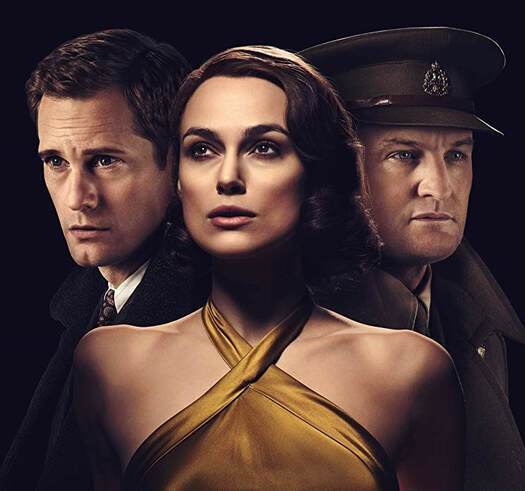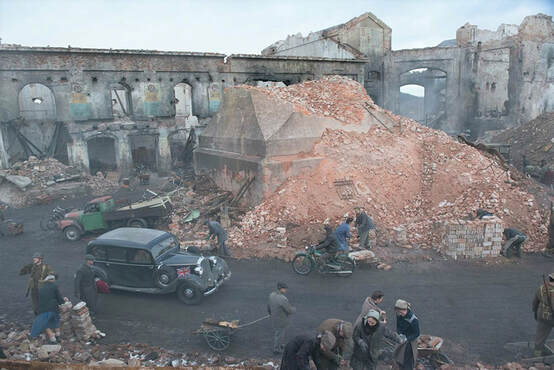THE AFTERMATH
***
Director: James Kent
Screenwriters: Joe Schrapnel, Anna Waterhouse & Rhidian Brook, based on Brook’s eponymous novel.
Principal cast:
Keira Knightley
Jason Clarke
Alexander Skarsgård
Flora Thiemann
Martin Compston
Kate Phillips
Country: UK/Germany/USA
Classification: MA15+
Runtime: 108 mins.
Australian release date: 11 April 2019
Previewed at: Event Cinemas, George Street, Sydney, on 3 April 2019.
Set in Hamburg in 1945, five months after the end of WWII, The Aftermath is, ostensibly, a story about an illicit love affair that smouldered in the ashes of a burnt and shattered city. The bigger topic, however, is whether or not a marriage can survive the death of a child. The war was over and Germany was under the combined rule of British, American, French and Russian forces. British troops were commissioned to oversee the reconstruction of Hamburg, which had been fire-bombed in 1943, resulting in the deaths of over 100,000 people, so the work was carried out in an atmosphere of antipathy and suspicion. The scale of the city’s destruction is revealed when the camera soars over the ruins and we see the surviving inhabitants sifting through the rubble in a vain attempt to recover something from their past lives and, often, the cadavers obliterated in the bombings.
A young English woman, Rachael (Keira Knightley), is sitting on a train eavesdropping on a conversation where a mother is telling her child that the Germans are not to be trusted. This sets the tone for the relationship between the conquerors and those who they defeated. Rachael is met at the station by her husband, Colonel Lewis Morgan (Australian actor Jason Clarke), who’s heading up the reconstruction project, and it is immediately evident from their awkward greeting that their relationship is somewhat distant. The bleak wintery conditions add to the chilly atmosphere. Rachael is taken to a beautiful mansion on the outskirts of town and discovers that they are to share their requisitioned home with the German owner, Stephen Lubert (Alexander Skarsgård), who was widowed during the war, and his aggrieved teenage daughter Freda (Flora Theimann). It seems that Lewis is a compassionate man who empathises with the non-combatant Germans, acknowledging that war does terrible things to peoples’ lives and the Lubert’s tale is not unlike many others. The screenplay exposes these ill effects by concentrating on the main characters and dealing with their fractured lives and subsequent relationships. It details the anxiety and depression that people experience in the aftermath of war, when their previous lives no longer exist, and loss and bereavement can be replaced by confusion and resentment.
The principal cast is excellent: Knightley successfully shows her character’s initial annoyance and bewilderment at finding herself in a house that doesn’t belong to her, where she is barely recognised as the mistress, but who comes to understand that, in fact, she and the owner have both suffered great loss; Clarke is very good as a man trying to rekindle his marriage while at the same time dealing with the displacement of the Germans and the cruelty of some members of his staff towards their charges, plus trying to mop up recalcitrant Nazis (he also demonstrates a top-notch upper-class British accent); only Skarsgård is a little hard to believe but that’s more to do with problems in the script than his acting ability. That said, the sumptuous sets (decorated by Monica Alberte), authentic production design (a credit to Sonja Klaus) and glorious costumes (designed by Monica Alberte) are the real stars of The Aftermath. They collectively transport the audience into the immediate post-war period. Martin Phipps’ score adds another effective element.
James Kent’s film was shot in just eight weeks on location in Germany and in the Czech Republic. Although it focuses on a deeply personal story, the director believed that the backdrop and settings should seem appropriately epic and cites David Lean as one of his influences. He has said, “What [Lean] captures so brilliantly is the coming together of the intimate and the epic, particularly in Doctor Zhivago, Brief Encounter, and Lawrence Of Arabia. Those films were touchstones for me because they have scale, but they are also deeply emotional films.” In The Aftermath, Kent has successfully managed to recreate the sweep and scale of the post-war setting but he’s failed with the intimacy of the love story at the film’s heart. There are too many unlikely plot devices in the script to make one believe in the truth of the tale. It’s great to look at but you won’t get lost in the drama.
Screenwriters: Joe Schrapnel, Anna Waterhouse & Rhidian Brook, based on Brook’s eponymous novel.
Principal cast:
Keira Knightley
Jason Clarke
Alexander Skarsgård
Flora Thiemann
Martin Compston
Kate Phillips
Country: UK/Germany/USA
Classification: MA15+
Runtime: 108 mins.
Australian release date: 11 April 2019
Previewed at: Event Cinemas, George Street, Sydney, on 3 April 2019.
Set in Hamburg in 1945, five months after the end of WWII, The Aftermath is, ostensibly, a story about an illicit love affair that smouldered in the ashes of a burnt and shattered city. The bigger topic, however, is whether or not a marriage can survive the death of a child. The war was over and Germany was under the combined rule of British, American, French and Russian forces. British troops were commissioned to oversee the reconstruction of Hamburg, which had been fire-bombed in 1943, resulting in the deaths of over 100,000 people, so the work was carried out in an atmosphere of antipathy and suspicion. The scale of the city’s destruction is revealed when the camera soars over the ruins and we see the surviving inhabitants sifting through the rubble in a vain attempt to recover something from their past lives and, often, the cadavers obliterated in the bombings.
A young English woman, Rachael (Keira Knightley), is sitting on a train eavesdropping on a conversation where a mother is telling her child that the Germans are not to be trusted. This sets the tone for the relationship between the conquerors and those who they defeated. Rachael is met at the station by her husband, Colonel Lewis Morgan (Australian actor Jason Clarke), who’s heading up the reconstruction project, and it is immediately evident from their awkward greeting that their relationship is somewhat distant. The bleak wintery conditions add to the chilly atmosphere. Rachael is taken to a beautiful mansion on the outskirts of town and discovers that they are to share their requisitioned home with the German owner, Stephen Lubert (Alexander Skarsgård), who was widowed during the war, and his aggrieved teenage daughter Freda (Flora Theimann). It seems that Lewis is a compassionate man who empathises with the non-combatant Germans, acknowledging that war does terrible things to peoples’ lives and the Lubert’s tale is not unlike many others. The screenplay exposes these ill effects by concentrating on the main characters and dealing with their fractured lives and subsequent relationships. It details the anxiety and depression that people experience in the aftermath of war, when their previous lives no longer exist, and loss and bereavement can be replaced by confusion and resentment.
The principal cast is excellent: Knightley successfully shows her character’s initial annoyance and bewilderment at finding herself in a house that doesn’t belong to her, where she is barely recognised as the mistress, but who comes to understand that, in fact, she and the owner have both suffered great loss; Clarke is very good as a man trying to rekindle his marriage while at the same time dealing with the displacement of the Germans and the cruelty of some members of his staff towards their charges, plus trying to mop up recalcitrant Nazis (he also demonstrates a top-notch upper-class British accent); only Skarsgård is a little hard to believe but that’s more to do with problems in the script than his acting ability. That said, the sumptuous sets (decorated by Monica Alberte), authentic production design (a credit to Sonja Klaus) and glorious costumes (designed by Monica Alberte) are the real stars of The Aftermath. They collectively transport the audience into the immediate post-war period. Martin Phipps’ score adds another effective element.
James Kent’s film was shot in just eight weeks on location in Germany and in the Czech Republic. Although it focuses on a deeply personal story, the director believed that the backdrop and settings should seem appropriately epic and cites David Lean as one of his influences. He has said, “What [Lean] captures so brilliantly is the coming together of the intimate and the epic, particularly in Doctor Zhivago, Brief Encounter, and Lawrence Of Arabia. Those films were touchstones for me because they have scale, but they are also deeply emotional films.” In The Aftermath, Kent has successfully managed to recreate the sweep and scale of the post-war setting but he’s failed with the intimacy of the love story at the film’s heart. There are too many unlikely plot devices in the script to make one believe in the truth of the tale. It’s great to look at but you won’t get lost in the drama.

